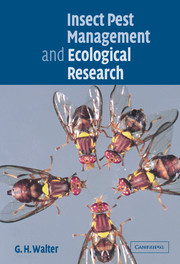Book contents
- Frontmatter
- Contents
- Preface
- Acknowledgements
- 1 Introduction
- Part 1 The place and nature of insect ecology research for IPM
- 2 Pest management as an applied science: the place of fact, theory and application
- 3 Historical trends in pest management: paradigms and lessons
- 4 IPM: a diverse, interrelated suite of socioeconomic and scientific problem-solving activities
- 5 An ecological underpinning for IPM
- Part 2 Specific directions in insect ecology research for IPM
- Part 3 Synopsis: Ecological research for IPM today
- References
- Index
2 - Pest management as an applied science: the place of fact, theory and application
Published online by Cambridge University Press: 22 August 2009
- Frontmatter
- Contents
- Preface
- Acknowledgements
- 1 Introduction
- Part 1 The place and nature of insect ecology research for IPM
- 2 Pest management as an applied science: the place of fact, theory and application
- 3 Historical trends in pest management: paradigms and lessons
- 4 IPM: a diverse, interrelated suite of socioeconomic and scientific problem-solving activities
- 5 An ecological underpinning for IPM
- Part 2 Specific directions in insect ecology research for IPM
- Part 3 Synopsis: Ecological research for IPM today
- References
- Index
Summary
Though the theory is worthless without the well-observed facts, the facts are useless without the frame of the theory to receive them.
nora barlow on charles darwin's (1958, p. 158) view of scienceScience tells us what we can know, but what we can know is little, and if we forget how much we cannot know we become insensitive to many things of very great importance.
bertrand russell (1961, p. 14)Introduction: Factual information and generalisation
Close examination of an example that stands squarely in the realms of pest management will help to introduce the methodological problems faced in IPM-oriented ecological research on pest or beneficial species. The development of ecological understanding of this nature invariably involves a range of theoretical intricacies.
Table 2.1 is a reproduction of the first page, of five, listing the names of all host plants of Helicoverpa armigera and H. punctigera in Australia (Zalucki et al., 1986). Consider, with regard to host plant use by H. punctigera, what actually represents a fact. Almost invariably respondents regard, as a fact, the observation that H. punctigera may feed on any one of numerous host species. By slight extension, it becomes a fact that H. punctigera is polyphagous. But these are not facts; rather, they are generalisations. Although such generalisations in biology have different facets, they are seldom specified in their entirety. In the example above, they specify pattern (H. punctigera larvae feed on many host plant species) as well as process.
- Type
- Chapter
- Information
- Insect Pest Management and Ecological Research , pp. 15 - 43Publisher: Cambridge University PressPrint publication year: 2003



